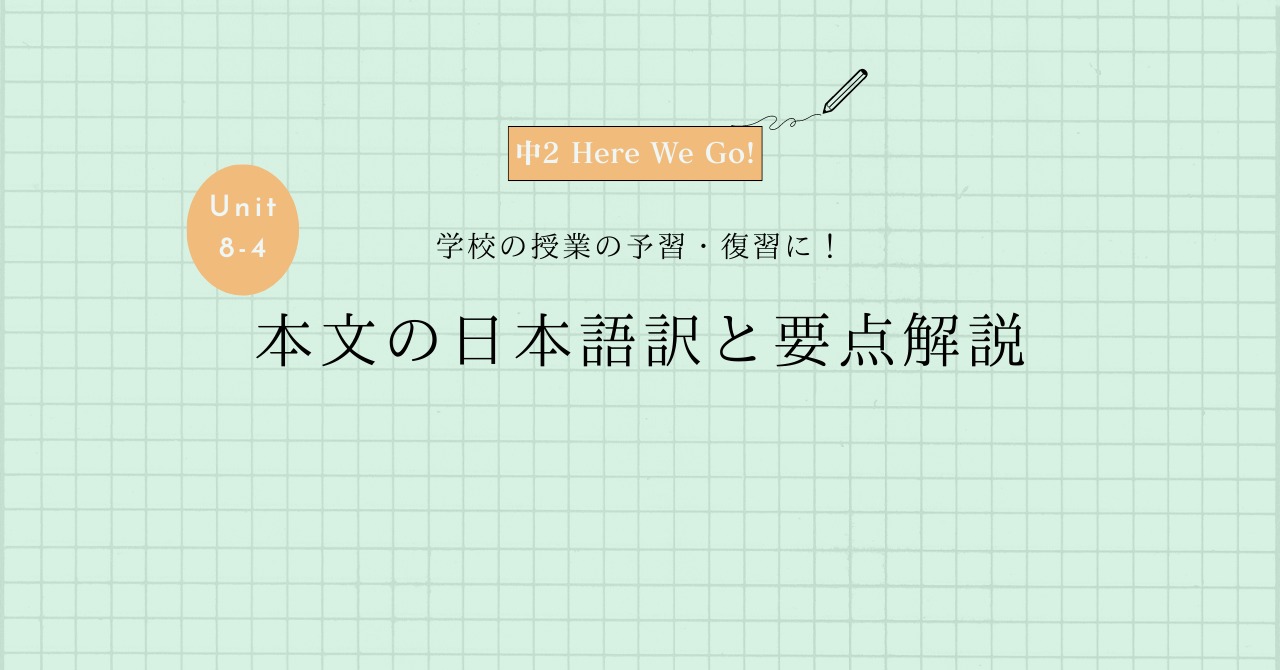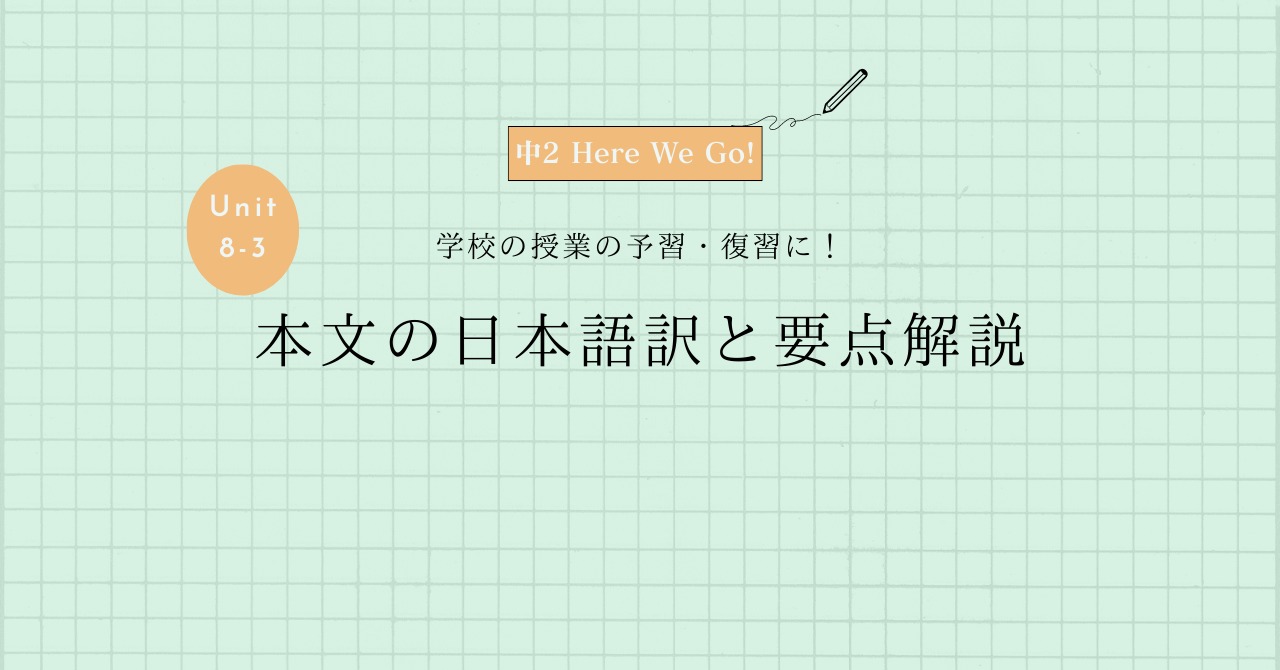光村図書 中学2年生 Here We Go! Unit8 Part4の本文の日本語訳と重要箇所の解説です。
Unit8-1,8-2,8-3の解説はこちらからご覧ください。
>中2Here We Go! Unit8 Part1 本文和訳
>中2Here We Go! Unit8 Part2 本文和訳
>中2Here We Go! Unit8 Part3 本文和訳
- Unit8 Part4 本文と日本語訳
- Unit8 Part4 重要事項の解説
- This musical is based on The Wizard of Oz.
- It was first played at a theater in San Francisco in 2003.
- There are two lead roles in this musical.
- They are totally different.
- On one hand, Glinda is popular, and she is good at making friends.
- On the other hand, Elphaba is not.
- When no one believed Elphaba, Glinda was always on her side.
- They trust and understand each other.
- I think the message behind this story is true.
- There is always someone on your side.
- This idea makes me happy.
- Unit8 Part4 まとめ
Unit8 Part4 本文と日本語訳
Honcho J.H.S. Newsletter
本町中学校 通信
My Favorite Musical
「私のお気に入りのミュージカル」
I want to introduce my favorite musical, Wicked.
「私のお気に入りのミュージカル,『ウィキッド』を紹介したいと思います。」
This musical is based on The Wizard of Oz.
「このミュージカルは『オズの魔法使い』に基づいています。」
It was first played at a theater in San Francisco in 2003.
「2003年にサンフランシスコの劇場で初めて演じられました。」
There are two lead roles in this musical.
「このミュージカルでは2人の主役がいます。」
They are witches. Their names are Glinda and Elphaba.
「彼女たちは魔女です。名前はグリンダとエルファバといいます。」
They are totally different.
「彼女たちはまったく異なります。」
On one hand, Glinda is popular, and she is good at making friends.
「グリンダは人気があり,仲良くなるのが上手です。」
On the other hand, Elphaba is not. She is lonely.
「その一方で,エルファバはそうではありません。彼女は孤独です。」
But one day they became friends.
「しかしある日,彼女たちは友達になりました。」
When no one believed Elphaba, Glinda was always on her side.
「誰もエルファバを信じないときも,グリンダはいつも味方でした。」
They trust and understand each other.
「彼女たちはお互いを信頼し,理解していました。」
I think the message behind this story is true.
「私は,この物語の裏にあるメッセージが真実だと思います。」
There is always someone on your side.
「いつも誰かがあなたの味方です。」
This idea makes me happy.
「この考えは私を幸せにしてくれます。」

Unit8 Part4 重要事項の解説
This musical is based on The Wizard of Oz.
“be based on~”で「~に基づく」という表現になります。文法としては「受動態」が使われています。
It was first played at a theater in San Francisco in 2003.
この文でも「受動態」が使われています。“first”は副詞で「初めて,最初に」という意味です。
There are two lead roles in this musical.
この文では“There is/are~”の表現が使われています。別記事で解説しているのでそちらをご覧ください。
“lead role”は「(劇の)主役」という意味です。
They are totally different.
“totally”は副詞で「まったく,完全に」という意味です。“total”は名詞で「合計」形容詞で「全体の」となります。
On one hand, Glinda is popular, and she is good at making friends.
“on one hand, ~”は「片方は~」といったニュアンスで,次に来る文章は「もう一方は~」という内容になります。
“be good at~”は「~が得意だ」という表現ですが,“at”は前置詞なので,後ろには名詞相当の表現が続きます。
“make friends”は「友達になる,仲良くなる」という意味で,“make friends with~”「~と仲良くなる」という形でもよく使われます。
On the other hand, Elphaba is not.
“on the other hand, ~”は「もう一方は~,一方で~」という意味です。前の文章の対比として使われます。
“Elphaba is not.”は“not”の後ろに“popular, and she is not good at making friends.”が入ります。
直前のGlindaに関する表現をすべて否定形にしてあげます。
When no one believed Elphaba, Glinda was always on her side.
“no one”は「誰も~ない」という意味で,この中に否定の表現が含まれているので,後ろに続く内容は否定形にしなくてOKです。
“be on one’s side”で「~の味方だ」という意味になります。“one’s”には所有格が入ります。
They trust and understand each other.
“each other”で「お互い」という重要表現です。必ず覚えておきましょう。
“each”単体だと「それぞれの~」という意味で,単数形の名詞と組み合わせます。
I think the message behind this story is true.
“behind”は「~の後ろに,~の裏側に」という意味の前置詞です。
There is always someone on your side.
この文でも“There is/are~”の表現が使われています。
“be on one’s side”は先ほど出てきた通り「~の味方だ」ですね。
“someone”は肯定文で「誰か」という漠然とした人を指します。疑問文・否定文では“anyone”にしてあげます。
This idea makes me happy.
“make 名詞 形容詞”で「名詞を形容詞にする」という文法ですね。別記事で解説しているのでそちらをご覧ください。

Unit8 Part4 まとめ
以上がUnit8 Part4の日本語訳となります。
“There is/are~”は様々な場面で頻出の重要文法です。英作文でも非常に使い勝手がいいので,使い方を必ず理解しておきましょう。
>中2Here We Go! Unit8 Part1 本文和訳
>中2Here We Go! Unit8 Part2 本文和訳
>中2Here We Go! Unit8 Part3 本文和訳
何か分からない点や他に解説してほしい点があれば,お気軽にコメントしてください!




コメント